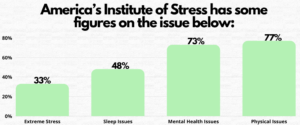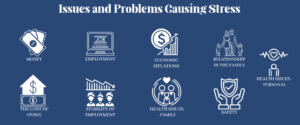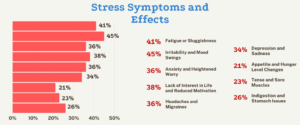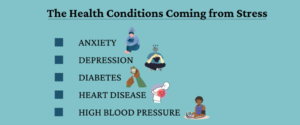
It’s no secret that today’s lifestyles and work habits are seriously impactful when it comes to our happiness and wellbeing, as well as our ability to ‘switch off’ at the end of the day.
When we consider just how hard we all work and the downtime that we have shrinking further as our work life invades our homes (whether it be due to COVID-19 or simply because of the internet providing access to our offices from everywhere) it’s no secret that stress is starting to take a hold on all of us.
Of course, stress is sometimes a good motivator to keep us going and to get our jobs done, but only if we know how to manage and switch it off.
It’s also good to know that you’re not alone in feeling stressed and dealing with both stress and anxiety in conjunction with one another. In fact, up to 80 per cent of the workforce feels stressed at some point, and because of this, we’ve all come to be a little more tolerant to those who are feeling a little on edge.
All that said, let’s take a look below at a few stress statistics and some symptoms that you might also be experiencing — and how to deal with them.

Just How Common is Feeling Stressed
When we take out all demographic data and cultural bias, just about everyone on earth experiences a level of stress. We’re all susceptible to this feeling, and it’s not contingent on anything relating to gender, age, location or even race. It’s essentially one of the most ‘human’ feelings or responses out there.

America’s Institute of Stress has some figures on the issue below:
- Around 33 per cent of people have experienced ‘extreme stress’
- Around 48 per cent of people have sleep issues resulting from stress
- Around 73 per cent of people have mental health issues from stress
- Around 77 per cent of people have physical issues from their level of stress
That in mind, for a vast majority of the people above, their stress levels have increased rather than withered with time. That said, everyone’s stress seems to be getting a lot worse rather than better.
The Stress Report from the Global Organisation for Stress outlines some more statistics below:
- Up to 75 per cent of Americans have hit a ‘high stress’ threshold in the last month
- For high school aged people, stress is their leading concern day-to-day
- Around 80 per cent of people deal with stress at work
When demographics are considered, there is another rather bleak picture being painted, at least for the American populace.

Those experiencing the highest stress rates include:
- Single Parents
- Women of all Demographics
- Minority Groups
- The Primary Decision-maker for a Household
Moving away from the United States, stress on the world stage is also not in the green either.
The Worldwide Stress Report
As we know, the US has a relatively poor rating when it comes to stress and stress management, though the world isn’t doing too great either.

A few reports and research studies have outlined the following stress statistics:
- Up to 86 per cent of all Chinese workers are experiencing high levels of stress.
- Around 91 per cent of Australians have a high level of stress.
- Over 450,000 British people have stated that stress has caused them to be sick.

Today’s Widespread Stress Disorders
As you might already know, when left unchecked, stress can manifest into an array of other problems and disorders. From reducing our lifespans to PTSD, stress can simply impact just about everything in our life.
Today, stress has caused symptoms of PTSD in more than 3.5 per cent of the adult population in the United States.
That in mind, acute stress disorder impacts just about half of all workers and teenagers who have been witness to a rather life-threatening event or serious stressor situation.
Issues and Problems Causing Stress

When things get a little complicated is in finding what’s causing the stressors for the global population, and as you will have guessed, these are generally based on life factors and situations.
Not all of us live our lives in the same place or with the same level of comfort, and as a result, the stressors in one city, nation or continent are quite different to one another. However, there are still some common stressors that are near-identical across the planet and these include:
- Money
- Employment
- Economic Situations
- Relationships in the Family
- Health Issues — Personal
- The Cost of Living
- Stability of Employment
- Health Issues — Family
- Safety
Stress Symptoms and Effects

As we mentioned above, stress has a lot of power when it comes to affecting us and our health, and it’s unfortunate for us to note that a lot of the issues associated with stress can reduce someone’s lifespan, happiness and physical fitness level.
It’s good to keep in mind that, although stress is rather common, there are coping mechanisms that are healthy which you can use to manage it and reduce your chances of dealing with the following symptoms:
- Fatigue or Sluggishness — Experienced by 41 per cent of People
- Irritability and Mood Swings — Experienced by 45 per cent of People
- Anxiety and Heightened Worry — Experienced by 36 per cent of People
- Lack of Interest in Life and Reduced Motivation — Experienced by 38 per cent of People
- Headaches and Migraines — Experienced by 36 per cent of People
- Depression and Sadness — Experience by 34 per cent of People
- Appetite and Hunger Level Changes — Experienced by 21 per cent of People
- Tense and Sore Muscles — Experienced by 23 per cent of People
- Indigestion and Stomach Issues — Experienced by 26 per cent of People
There are also a few other common issues such as sexual problems as well as memory loss and forgetfulness and routine stomach problems which result in nausea and vomiting as well as diarrhoea.
Quantifying the Cost of Stress
Looking beyond the human impacts of stress, it’s important to keep in mind that a stressed workforce is not working at its full potential.
When we’re stressed we’re at a higher risk of missing our commute, staying home from a day or work or school, forgetting or not caring to see a doctor and potentially even passing away as a result of stress-induced health problems.
That in mind, there are billions of dollars lost in economies around the world as a result of stress, and because of this, it’s vital for you as an employee to manage your stress as to not affect your profitability for yourself and your employer.
Studies have outlined that around $300 billion is lost to stress-related issues each year in the US, which is monumental with regards to lost growth opportunities for businesses and staff.
In Australia the picture is quite similar, with $14.2 billion lost to stress each year and $37 billion in the United Kingdom.
All that said, stress isn’t only wreaking havoc on the workforce, but also the economy on a global scale.
The Health Conditions Coming from Stress
Coming away from the financial cost of stress and looking at the effect of high stress on people, there are a few health issues that come from this too.

Some of the most common issues include:
- Anxiety
- Depression
- Diabetes
- Heart Disease
- High Blood Pressure
With those in mind, there is a real need to handle stress to reduce your chances of getting these disorders and reducing your lifespan.
Keep in mind that there is a higher chance of early death in those of us who are stressed in the long-term and aren’t able to develop coping mechanisms which enable to us to reduce this level of stress.
A few other issues resulting from stress do include cancer, accidents, lung disease as well as suicide.
When it comes to coping, a lot of those in high stress situations or lifestyles turn to substances that are far from healthy. Whether it be alcohol or drugs, these are going to offer a mild release in stress in the short term, though will slowly become a ‘must’ for sufferers, which then results in an addiction.
The Prognosis on Stress
When it comes to the outlook of stress, things do become quite bleak if this stress isn’t managed correctly.
A vast majority of sufferers in high-stress for prolonged periods of time will find that there aren’t too many positives here. Along with the health issues listed above, stress can simply speed up the ageing process of the body and shave a decade or even more off of one’s life.
How We Go About Diagnosing Stress and the Associated Disorders
Although stress is generally seen as something someone goes through alone and that not too many of us can ‘see’ or understand, there is still a diagnoses process which can be undertaken to pinpoint and confirm that an individual is dealing with a high level of stress, or a stress-related disorder.
You’ll be directed to a care physician for this and a mental health professional will take a look at both psychological symptoms along with physical ones that could be the result of stress.
Following this, there are also assessments and testing that takes place which enables these physicians to give patients the direction they need to understand, manage and overcome the stress level.
Stress Treatment and Typical Outcomes
When it comes to the treatment of stress, it’s good to note that by developing coping skills and building a routine that enables individuals to handle this stress in a healthy way, the outcomes are often excellent.
In a vast majority of people, these coping mechanisms can rejuvenate their lives and also become part of a healthy routine. For example, sport, yoga and other mindfulness exercises are often used to manage stress and all of which work wonders on physical health along with mental health.
With this in mind, these coping techniques can also improve how someone perceives stress too. Which means when these situations occur, you’re better able to understand what’s happening and simply ‘push off’ the stress.

A few of the most common stress treatments, which you can make use of at home, include:
- Focusing on Relaxation as a Coping Mechanism
- Hanging out With Loved Ones
- Following a List-based Routine
- Working to Identify and Understand Stress
- Prioritising Exercise and Sleep
With those treatments and coping mechanisms, a vast majority of stress sufferers can work to manage their stress levels in a way that is healthy and proven to offer long-lasting results rather than end in a relapse.





